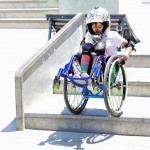
We were cruising through the grocery store when I heard Ella say to herself, “Ugh. I hate that.”
I looked around and didn’t see anything out of the ordinary, so I asked, ” What do you hate?”
“When moms tell their kids to not look at me. It’s like I’m supposed to be invisible.”
I knew exactly what she meant, because I’ve said it myself. I’ve been in public when we see someone with an obvious disability and my children will begin to stare, point, or say something and I immediately shush them and whisper, “Don’t stare. It’s rude.”
As we walked towards the produce in a store crowded with Sunday afternoon shoppers, I paid attention and she was right. All of the children who looked in her direction were gently corrected into looking the other way, while the adults we encountered would give her a sideways glance and make an obvious effort to not stare. She was right, she was treated as if she were less human than any other person in the store.
The parents we encounter on a regular basis aren’t trying to be unkind, and we know that. They are doing their best to try and teach their children to treat others with dignity. It’s unfortunate that the message they send is exactly the opposite of what they intend.
It’s a fact that kids like to stare at people. From their infancy, children study faces and we accept it as normal. They stare at fat people and skinny people, the beautiful and the unattractive, the short and the tall, the black and the white, the very old and especially other children. They stare and stare until the subject of their fascination locks eyes with them, and then more often than not they both end up grinning. Everywhere we go, children are encouraged by the reactions of other people to be curious about those around them. Everyone except the handicapped. This one minority group is singled out as the only one children cannot examine. The only one they get into trouble for looking at. Which left me wondering what kind of message does that send about their humanity?
By the time we reach adulthood, looking away from the differently-abled has become a deeply ingrained societal norm. As we pass by those with disabilities, our eyes drop to the floor or dart across the room. We look anywhere except at the person right in front of us. In our eagerness to not stare, we no longer look. In our efforts to be kind, we have ensured that they are never seen.
I asked my daughter how being studiously ignored makes her feel. She thought a long time before saying, “People look at me. I know they do because I can see it out of my side vision. I get it. I’m a 10-year-old in a wheelchair. It’s weird. But if I turn in their direction, they turn away like this is something they can catch or like I’m nasty to look at. It’s like I’m not even a person at all.”
“Do you think they’re trying to be mean?” I asked her.
“No,” she replied. “I don’t think they know what to do or to say to their kids about me.”
“What do you wish they would say?”
“When their kids are looking at me, they shouldn’t say ‘Don’t look.’ They should just say ‘Smile and say hi.'”










